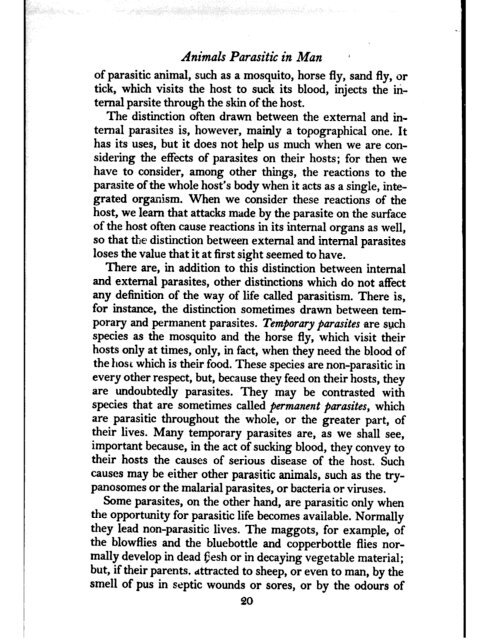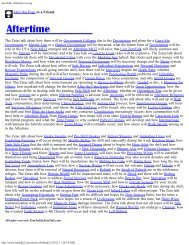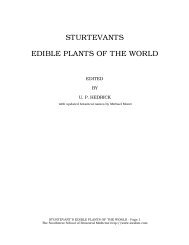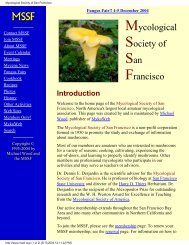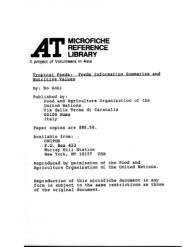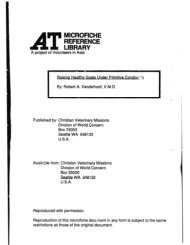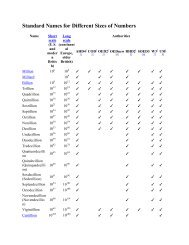- Page 1: A project of Volunteers in Asia Ani
- Page 4 and 5: Animals Parasitic ffrey LaPage This
- Page 6 and 7: ANIMALS PARASITIC I IN MAN Geufrey
- Page 8 and 9: Gmtmts LIST OF PLATES LIST OF TEXT
- Page 10 and 11: List of Text Fipres I. Am&u pro&r~,
- Page 12 and 13: . List of Text Fi@res 67. Head of t
- Page 14 and 15: Editorial Foreword of biology, illu
- Page 16 and 17: i 1 I ? CHAPTER ONE What is a Paras
- Page 18 and 19: W&at is a Parasitic Animal? individ
- Page 20 and 21: Wht id a Parasitic Animal? plants,
- Page 24 and 25: Wht is a Parasitic Animal? excremen
- Page 26 and 27: _- ),.,> > /’ /’ I‘ / ,,*’
- Page 28 and 29: The Kinds of Parasitic Animals of P
- Page 30 and 31: I The icinds of Parasitic Animals a
- Page 32 and 33: ^’ _ .-- ___-_ -- __. _.-- -- _--
- Page 34 and 35: I P c’ I .! The Kinds of Parasiti
- Page 36 and 37: Inside the snail it develops into a
- Page 38 and 39: The Kinds of Pmai ever, introduce a
- Page 40 and 41: The Kinds of Parasitic Animals more
- Page 42 and 43: CHAPTER THREE The Lone Hatlds I N t
- Page 44 and 45: The Lone Hands are thus smaller tha
- Page 46 and 47: The Lone Hands by entering this hos
- Page 48 and 49: Th Low Hands eggs of this species,
- Page 50 and 51: . E. histolytica E . coli pathogeni
- Page 52 and 53: The Lone Hunch inch. Within the var
- Page 54 and 55: The Lone Hands is swa&6wed by anoth
- Page 56 and 57: The Lone Hands Balantidium cola’
- Page 58 and 59: The Lme . an& 4 weeks in the world
- Page 60 and 61: CHAPTER FOUR Tbt Lme Han& (CONTINUE
- Page 62 and 63: Th Lone Hands containing lnf&tlve s
- Page 64 and 65: , Tk Lone Hands they are applied. T
- Page 66 and 67: Animals Parasitic in Man year by th
- Page 68 and 69: Animals Parasitic in Man convey the
- Page 70 and 71: Animals Parasitic in Man intestine
- Page 72 and 73:
Animals Parasitic in Man which are
- Page 74 and 75:
Anidi Parasitic in Man is experimen
- Page 76 and 77:
CHAPTER FIVE Animats Twice Parasiti
- Page 78 and 79:
Animals Parasitic in Man The adult
- Page 80 and 81:
Anid Parasitic in Man The We histor
- Page 82 and 83:
Animals Parasitic in Man inch) long
- Page 84 and 85:
Animals Parasitic in Man life histo
- Page 86 and 87:
Animals Parasitic in Man beings inf
- Page 88 and 89:
Animals Parasitic in Man adult male
- Page 90 and 91:
Animals Parasitic in Man veins near
- Page 92 and 93:
,.A --- Animals Parasitic in Man ca
- Page 94 and 95:
Ani,& Parasitic in Man heart and th
- Page 96 and 97:
1 Animali Parasitik in Man testinal
- Page 98 and 99:
Awkals Para.sitic in Man The develo
- Page 100 and 101:
A&t& Parasitic in Man bution is thu
- Page 102 and 103:
. Animals Pamdie in Man chronic inf
- Page 104 and 105:
Animals Parasitic in Man The infect
- Page 106 and 107:
Anitils Parasitic in Man been given
- Page 108 and 109:
Animals Parasitic in Man in the hea
- Page 110 and 111:
CHAPTER SIX Animals Twice Parasitic
- Page 112 and 113:
I* Animals Parasitic in Man adult m
- Page 114 and 115:
Animats Parasitic in Man has a tail
- Page 116 and 117:
Animals Parasitk in Mm whole chain
- Page 118 and 119:
Animal Parasitic in Man (recephuutu
- Page 120 and 121:
Animals Parasitic in Man relatives
- Page 122 and 123:
Animals Parasitit in Man f’&lized
- Page 124 and 125:
Animals Pars&tic in Mm the only int
- Page 126 and 127:
I’ !I> ~.a . ! Animals Parasitic
- Page 128 and 129:
Anid Para*tk in Man ing f&m abdomin
- Page 130 and 131:
;’ :., \ - c i AzkaLs Parasitic i
- Page 132 and 133:
Animls Parasitic in Mm ments and a
- Page 134 and 135:
Animals Parasitic in Man come the l
- Page 136 and 137:
Animals Pmasific in Man The chief e
- Page 138 and 139:
Animals Pam&c in Man The chief&&s o
- Page 140 and 141:
Animals Parasitic in Mm are lang. I
- Page 142 and 143:
length of a cricket pitch. Its body
- Page 144 and 145:
terminal segments only, which are c
- Page 146 and 147:
Animals Parasitic in Man fish. If t
- Page 148 and 149:
Animals Parasitic in Man the Qpisth
- Page 150 and 151:
Animals Pimsitic in Mm CIonurchis s
- Page 152 and 153:
Animals Parasitic in Man there may
- Page 154 and 155:
Animals Parasit& in Man This fluke
- Page 156 and 157:
I” : Animds Pam&k in Man man eats
- Page 158 and 159:
. I Animals Parasitic in Man opercu
- Page 160 and 161:
CHAPTER EIGHT \ The Mularid Parasit
- Page 162:
asexual mriit!plltatibn In the live
- Page 165 and 166:
(a) Enter&us we?wzicuiuris, the hum
- Page 167:
wl (a) The human head louse, Pedicu
- Page 171:
The Multzrial Parasites may be inje
- Page 174 and 175:
Animals Parasitic in Man when it is
- Page 176 and 177:
Animals Paradic in Man by boats ply
- Page 178 and 179:
Animals Parasitic in Man ous areas,
- Page 180 and 181:
Anintats Pwasitik in Man day, so th
- Page 182 and 183:
- Animals Parasitic in Man glands c
- Page 184 and 185:
Animals Parasitic in Man parasitic
- Page 186 and 187:
Animals Parasitic in Man area, as f
- Page 188 and 189:
Animali Parasitic in Man humidity a
- Page 190 and 191:
Animals Parasitic in Man THE CONTRO
- Page 192 and 193:
Animals Parasitic in Man when, in 1
- Page 194 and 195:
CHAPTER NINE The Human Trypanosomes
- Page 196 and 197:
Anhals Parasitic in Man tory, some
- Page 198 and 199:
Animals Parasitic in Man of the gen
- Page 200 and 201:
Animals Pamsitk in Man canal. From
- Page 202 and 203:
Aninds Parasitic in Man say, exactl
- Page 204 and 205:
Animals Parasitic in Man The diseas
- Page 206 and 207:
Animals Parasitic in Man hours and
- Page 208 and 209:
Aniin.& Para.Ctic in Man been eff
- Page 210 and 211:
Animals Pamsitic in Man miasis in f
- Page 212 and 213:
Animals Parasitic in Man trypanosom
- Page 214 and 215:
Animals Parasitic in Man Z%e Genus
- Page 216 and 217:
Animali Parasitic in Man species of
- Page 218 and 219:
Animals Purusitic in Man micra long
- Page 220 and 221:
Animals Parasitic in Man called the
- Page 222 and 223:
Anintals Parasitic in Man round the
- Page 224 and 225:
Animals Parmitic in Man into the br
- Page 226 and 227:
Animals Parasitic in Man The mouthp
- Page 228 and 229:
Anhnals Pmasitk in Man blood of the
- Page 230 and 231:
An&& Parasitic in Man a way through
- Page 232 and 233:
Anid Parasitic in Man means of a ma
- Page 234 and 235:
Animals Parasitic in Man species th
- Page 236 and 237:
anging from 7 days to a year, accor
- Page 238 and 239:
Animali Parasitic in Man Ctenoc~Mid
- Page 240 and 241:
Animals Parasitic ir~ Man tion of t
- Page 242 and 243:
Animak Parasitic in Man tissue-flui
- Page 244 and 245:
Animals Parasitic in Man generation
- Page 246 and 247:
Animali Parasitic in Man Europe (bu
- Page 248 and 249:
Animals Parasitk I& Man pupate ther
- Page 250 and 251:
Anid Pam&k in Man may develop in th
- Page 252 and 253:
Animals Parasitic in Maa Ticks Tick
- Page 254 and 255:
Animals Pmzsitic in Man other hand,
- Page 256 and 257:
Animals Parasitic & Man terranean a
- Page 258 and 259:
Animals Parasitic in Man one variet
- Page 260 and 261:
Animals Parasitic in Man Mellanby (
- Page 262 and 263:
Animals Paradk in Man LimguatuIids
- Page 264 and 265:
CHAPTER ELEVEN Gain and Loss for th
- Page 266 and 267:
Atlimls Pmzsitic in Man performed b
- Page 268 and 269:
Animals Pamsitic in Man reduction o
- Page 270 and 271:
Animds Parasitic in Man chapter 9 a
- Page 272 and 273:
Animals Parasitic in Man a total of
- Page 274 and 275:
and other species of parasitic inse
- Page 276 and 277:
Animals Parasitic in Man whether th
- Page 278 and 279:
Aninzals Parasitic irz Man repeated
- Page 280 and 281:
are, like the roundworms, unisexual
- Page 282 and 283:
Animali Parasitic in Mm classified
- Page 284 and 285:
Animals Parasitic in Man mansoni, m
- Page 286 and 287:
Animals Parasitic in Man when peopl
- Page 288 and 289:
Animals Parasitic in Maz of man. It
- Page 290 and 291:
Animals Parasitic ilt Man tapeworm,
- Page 292 and 293:
Animds l%msitz’c in Man solid foo
- Page 294 and 295:
larvae of the trichiia worm could n
- Page 296 and 297:
Animals Parasitic in Man fingers or
- Page 298 and 299:
Animuls Ibnz.sitic in Man excreta.
- Page 300 and 301:
Animals Parasitic in Man worms; and
- Page 302 and 303:
Animals Parasitic in Man are derive
- Page 304 and 305:
Animals Parasitic in Mdn biology of
- Page 306 and 307:
Animals Parasitic in Man chapter IO
- Page 308 and 309:
Animals Parasitic in Man the Bible
- Page 310 and 311:
Animals Parwitic in Man To a world
- Page 312 and 313:
Animah Parasitic in Man more space
- Page 314 and 315:
Further Reading \(Most of the liter
- Page 316 and 317:
Animals Parasitic in Man *McNalty,
- Page 318 and 319:
Auto-infection, 66 Avicenna, 297 Av
- Page 320 and 321:
h&X hosts and life history, 247-8,
- Page 322 and 323:
In&$ Grocer’s itch, 241 Hookworms
- Page 324 and 325:
Index Linguatula serrata, anatomy,
- Page 326 and 327:
supplies, 300-l ; hermaphroditism o
- Page 328 and 329:
In Signet&g stage of malarial paras
- Page 330:
Wuchcrera bancrofti, anatomy, life


